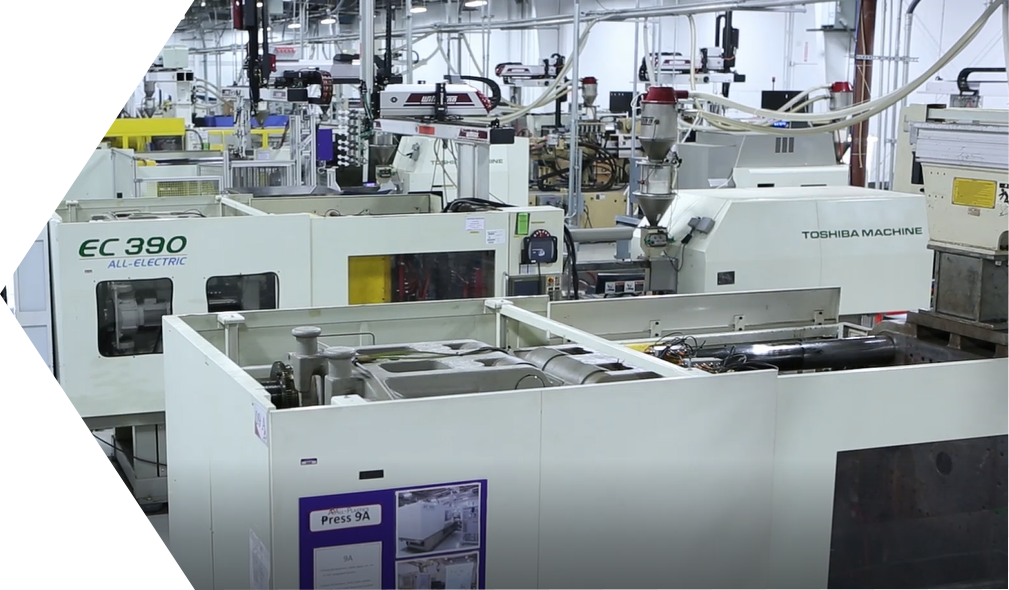
ISO 13485
Providing high quality products is our #1 priority and we will take every precaution in guaranteeing all products meet all requirements. We deliver high quality products, every-time, and provide return on investment through asset life extension.
















| Case Study | 16 Cavity Mold | Guarantee | Prices/Year | Piece Price | Sales Revenue | 2-Year Piece Price |
New Mold | Total Cost | 2-year Savings |
|---|---|---|---|---|---|---|---|---|---|
| Competitor | $245,000 | 1 Million Shots | 16 Million Pieces | $0.050 | $800,000 | $1,600,000 | $245,000 | $1,845,000 | $0 |
| All-Plastics | $245,000 | 2 Million Shots | 16 Million Pieces | $0.055 | $880,000 | $1,760,000 | $0 | $1,760,000 | $85,000 |
Scientific Injection Molding (SIM), also known as Decoupled Injection Molding, is a systematic approach to molding in which the fill, pack and hold stages are treated separately to minimize fluctuations while improving product consistency.
Unlike traditional injection molding, SIM relies on controlled, data-driven processes. It accepts the scientific principle of plastic behavior and combines them with known variables we can control to reduce cycle times and increase machine efficiency.


Scientific Molding minimizes start-up and cycle times while reducing scrap. It also streamlines problem-solving and process consistency, boosting profitability and efficiency.
With Scientific Molding, process development and troubleshooting methods are standardized across technicians, presses, molds and companies, ensuring consistent, effective practices.
Scientific Molding focuses on material behavior, allowing for machine-independent processes. This flexibility reduces the need for machine-specific parameters.
Scientific Molding guarantees consistent part quality regardless of machine, material or mold variations, enhancing product reliability and customer satisfaction.
Scientific molding uses a wide range of materials, each chosen based on specific requirements and desired final product characteristics. These include the following:
Material properties such as melt temperature, melt flow rate, thermal conductivity and viscosity are critical factors in SIM. These properties affect how the material behaves during the molding process, which influences the final product’s quality and consistency.
With these considerations in mind, the choice of material is crucial to the success of scientific molding as it directly impacts the final product’s properties. Some material characteristics to consider include the following:
Before beginning the molding process, materials undergo thorough characterization. This involves testing and analyzing properties like molecular weight distribution, rheological behavior, and thermal properties, ensuring precise control and predictability during molding.
The following are reasons why material characterization is essential in scientific molding:
Accurate documentation is a fundamental aspect of scientific molding. It involves the meticulous record-keeping of all process parameters like temperature, pressure, cycle time and cooling rates to ensure repeatability and traceability in production.
Beyond continuously monitoring relevant process parameters, process documentation offers other invaluable benefits. For instance, adopting a data-driven approach supports ongoing process optimization, which helps manufacturers fine-tune their operations for improved efficiency and product quality over time.
In highly controlled processes like scientific molding, slight deviations can lead to defects or inconsistencies in the final products. To eliminate or minimize these deviations, injection molding machines are calibrated to maintain precision and consistency.
During calibration, engineers carefully set and continually monitor all production variables to ensure the machine operates within the specified parameters, minimizing the likelihood of deviations.
Once calibrated, the injection machine serves as a reliable workhorse, capable of precisely replicating the ideal conditions identified during the setup phase, ultimately contributing to the cost-effectiveness and reliability of the entire manufacturing process.
The role of software in Scientific Injection Molding (SIM) is instrumental in elevating the precision, efficiency, and overall performance of the manufacturing process. Advanced software solutions help ensure the success of injection molding projects as they enable more precise control and quicker response to deviations, further improving the molding process:
Telecommunications: Precision molding supports the production of high-performance equipment.
Advantages of a Decoupled Process Request a Quote




